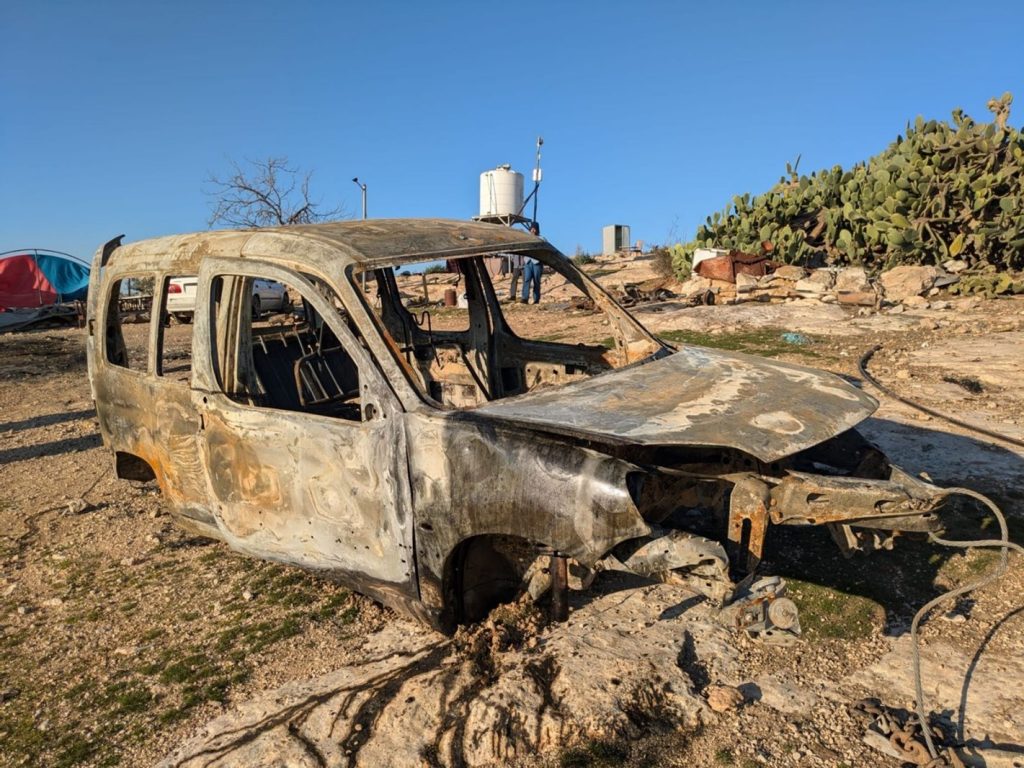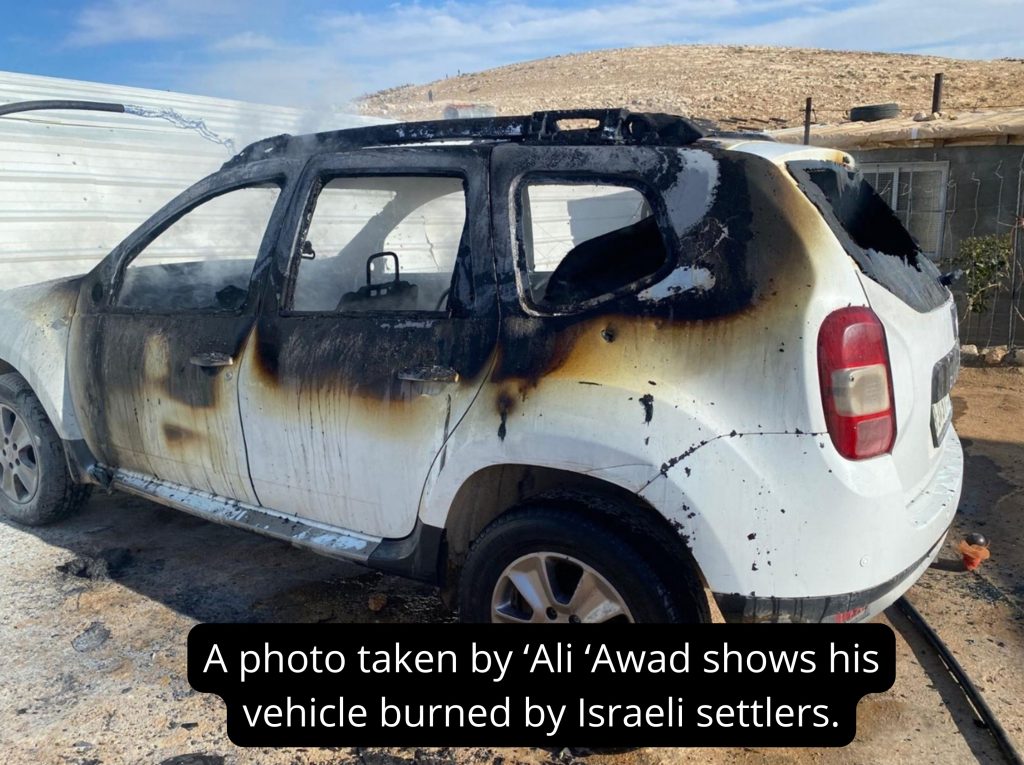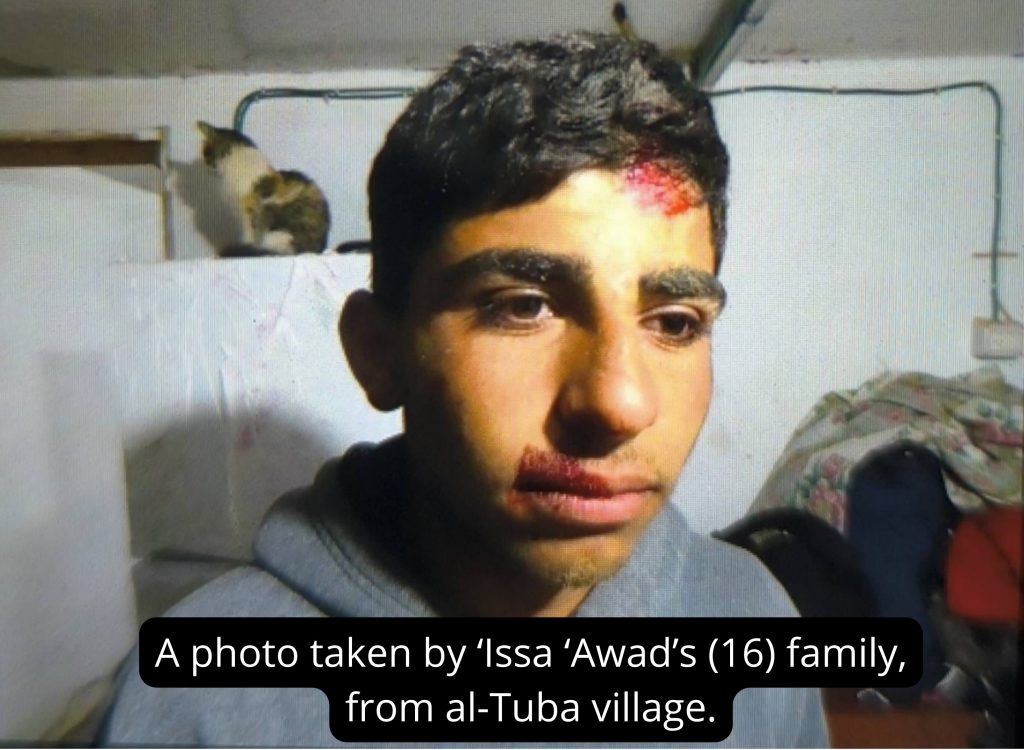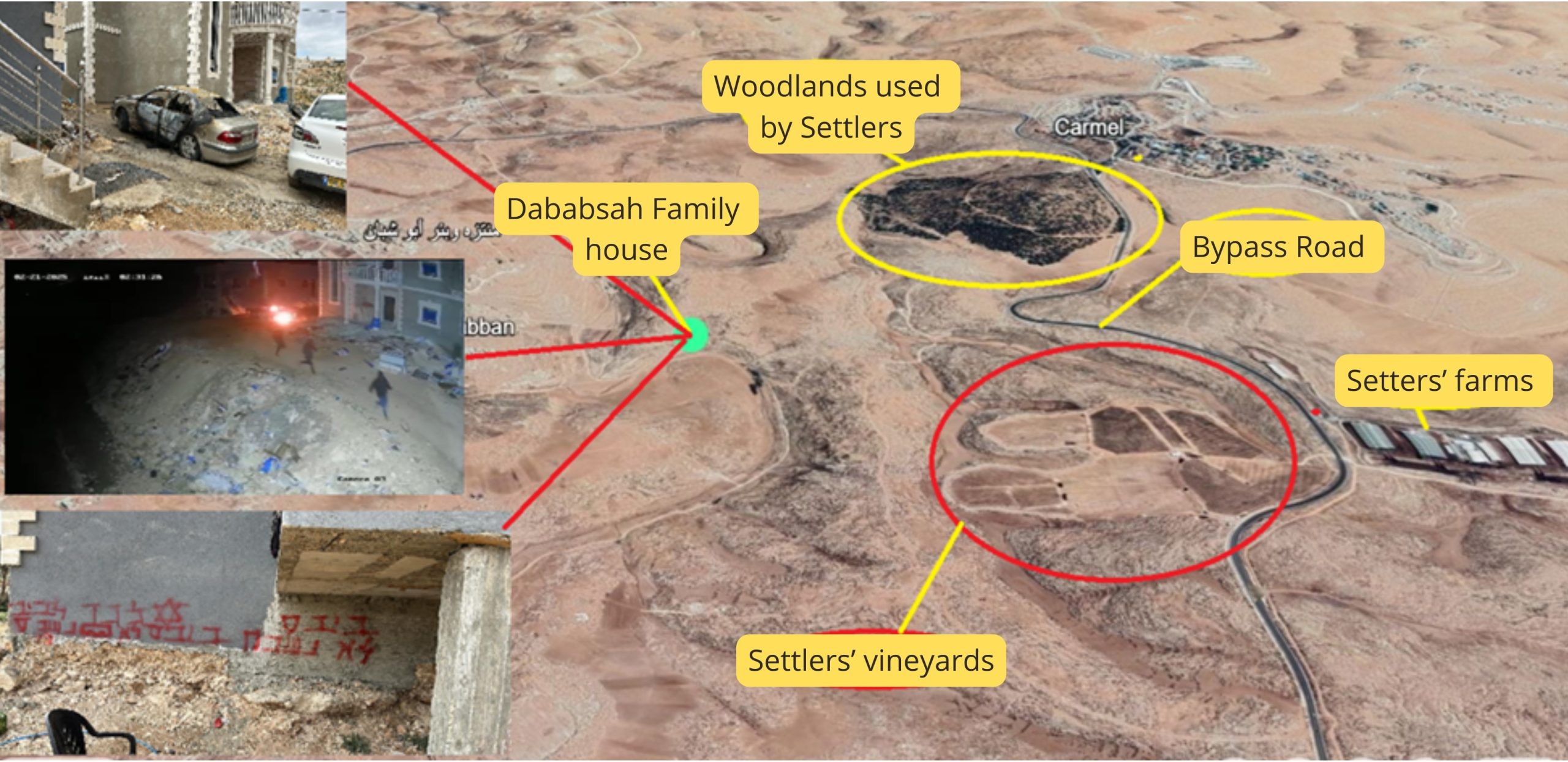
Israeli settlers’ attacks are escalating in Hebron, south of the West Bank, due to Israeli Occupation Forces’ (IOF) impunity and complicity. IOF do not only refrain from intervening to stop these attacks but provide protection to settlers while carrying out their systematic attacks against Palestinians and their property.
Hebron is the city most affected by Israeli settlement activity, as there are many settlement outposts established deep into the city, especially in Hebron’s Old City, where Palestinians live under coercive conditions, including tightened restrictions on movement and imposition of ongoing military control over the city.
The Palestinian Centre for Human Rights (PCHR) has documented an alarming surge in the number and types of violations carried out by Israeli settlers, including direct physical assaults, property destruction, house raids, and repeated threats aimed at terrorizing and forcibly displacing residents.
According to our staff’s documentation, Israeli settlers carried out 46 attacks against Palestinian civilians and properties in Hebron during the first quarter of 2025, marking a significant increase compared to previous years. This provides clear evidence of the legal and financial support provided to settlers by the Israeli Government.
The setters’ attacks indicate a systematic Israeli policy aimed at depopulating vital areas in Hebron of their Palestinian residents. This is part of Israel’s broader policy of forced displacement and ethnic cleansing, in blatant violation of international humanitarian law and international human rights law.
This report highlights and documents these violations with evidence and testimonies to raise awareness within the international community about acts of violence and ethnic cleansing under official Israeli support. It also urges relevant international stakeholders to take effective steps to protect Palestinian civilians and put an end to the Israeli authorities’ settlement crimes and racial discrimination.
Currently, there are no accurate statistics on the number of settlers in Hebron due to the latter’s constant movement to and from the city, as well as the establishment of dozens of new settlement outposts. However, estimates up to 2022 indicate that around 23,326 settlers1 are residing in 21 settlements and 47 outposts across Hebron. These settlements and outposts have isolated thousands of dunams of land behind and around them, preventing Palestinians from constructing or planting on these lands. Meanwhile, the population of Hebron is estimated at about 842,000 people until 2024, according to the Palestinian Central Bureau of Statistics (PCPS)2.
For more details on settlement reality in Hebron, see: Field Report on Accelerated Settlement Activities in Hebron
According to our field researcher’s follow-up in Hebron, the city has witnessed a range of various and widespread settlers’ attacks targeting Palestinian residential communities, spreading from one village to another and from one neighborhood to the next. These attacks include assaults on Palestinians and their property, land seizures, and the establishment of settlement outposts, which are then used as launching points for further attacks. These ongoing and serious attacks are carried out under the IOF’s protection, complicity or deliberate neglect, reflecting a broader policy by Israel to alter the demographic reality in several neighborhoods in Hebron in favor of settlers.
Recurrent Attacks on Susya Village
“It has been a tragic year for the villages of Yatta and Susya village in southern Hebron south, where settlers’ attacks continued throughout March. Not a single day passed without an assault, whether during the day or at night. These attacks resulted in destruction and burning of vehicles, damage to several homes, as well as physical assaults and arrests. Most of the attacks were led by a settler-shepherd leader known to residents as ‘Sham Tov Lotsky.'”
This was the testimony of PCHR’s field researcher, Emad Abu Hawash, about the village and the attacks it has been exposed to in broad daylight and in the presence of the IOF.
Abu Hawash added: “At approximately 16:00 on Tuesday, 11 March 2025, while I was taking photos of damage caused to Palestinians’ houses in Susya village, I heard screams coming from the eastern side of the village. I rushed there to find out what was going on. I saw three masked setters carrying batons, shouting, and throwing stones at Ahmed Nawaj’ah’s house. I could hear women inside the house screaming. One of the settlers was also chasing Ahmed Nawaj’ah’s sheep. The residents were terrified and exhausted, especially as they were fasting for Ramadan.
The setters then fled after the villagers confronted them. It is worth noting that this was not the first attack on al-Nawaj’ah’s family house.”

Ahmed al-Nawaj’ah’s wife, Halima Khalil Abu ‘Eid, from Susya village, told PCHR’s researcher about one of the setters’ attacks on their house:
“At around 18:00 on Sunday, 03 February 2025, I was sitting at home with my husband and children after having iftar (during the month of Ramadan). Then, we learned through WhatsApp groups that settlers were spreading around the village. The dogs outside began barking loudly. Worried about our sheep in the barn, we went out to check on them and see what was happening. As soon as we opened the door, stones started falling on us like rain. There were settlers surrounding the house and throwing so many stones, preventing us from getting outside. The stone-throwing continued for about half an hour; during which, my husband called the neighbors and the Israeli police to come and help. Meanwhile, the villagers began shouting, and our children managed to escape, running toward the nearby hill where their aunt, Rabeeha Jabr al-Nawaj’ah, lives. The children were terrified of the settlers, but thankfully we managed to get out of the house. Villagers began to gather and shout at the settlers, while a vehicle carrying foreign activists in the area tried to follow and photograph them. I saw seven settlers carrying batons around our house before they fled toward a settlement outpost near the Susya settlement. I was hit with a stone in my right cheek, while Rabeeha was hit with a stone in her right waist. It was a terrifying day! “


In another attack on the village, Inshirah Shuraiteh recounted a terrifying night she and her children endured in Susya village:
“At approximately 19:00 on Monday, 03 February 2025, I was at my home with my husband and our four children, including two little ones. It was a very cold night. We heard screams from nearby homes. My husband went outside to see what was happening and came back to tell me that settlers had attacked Naser Nawaj’ah’s house, which is about 100 meters away from ours. He told me not to leave the house and to lock the door tightly. He then stayed outside to monitor the situation, fearing that the settlers might also attack his second wife’s house and their children. Shortly after, I heard my husband shouting at the settlers. I became terrified and realized they had attacked his second ife’s house. I was very worried about them and about my husband, who might also be attacked by the settlers. Around ten minutes later, stones began to fall heavily on our house and windows. My children started screaming and crying hysterically, trembling with fear. I also heard my husband’s car windows being smashed, as it was parked near the house. After about 20 minutes of continuous attacks, the noise finally calmed down. My husband knocked on the door and told me the settlers had left.”



The situation in al-Tuba village, east of Yatta, was no better, as it witnessed recurrent settler attacks. This came at a time when the Israeli authorities declared the village part of Area 918, which is classified as a military training zone.
In al-Tuba village, the ‘Awad family is exposed to daily attacks by Israeli settlers and shepherds who frequently gather in front of their houses. The villagers believe that these assaults and the surge in settler violence, carried out without any deterrence, are intended to force them to abandon their land and leave the village.
Many attacks are carried out by settlers from a settlement outpost led by an Israeli settler namely Askhar Man. On 25 January 2025, the U.S. lifted sanctions previously imposed on him. Askhar has established cattle and sheep farms and seized hundreds of dunums in al-‘Ain al-Bayda area, where he planted vineyards on confiscated Palestinian-owned lands.


‘Ali Rashid ‘Awad, from al-Tuba village, described one of the settlers’ attacks that occurred on 25 February 2025 as follows:
“While I was sitting in my Dacia Duster car in front of my house in al-Tuba village, I suddenly saw a group of settlers about 200 meters away to the west of the village. The settlers were coming from “Ma’on” settlement and “Havat Ma’on” Settlement outpost. The settlers were masked and ran towards our houses. At that moment, I realized they were planning to attack the homes in the village and carry out their usual assaults. I immediately started calling out to my family. There were dozens of my young cousins in the area. I got out of the car and told them to flee to avoid being attacked by the settlers. In about a minute, I tried to return to the car and drive away, but I saw the settlers running on the only road leading to our family homes. One of them was carrying a rifle, another was holding a glass bottle, and the rest were carrying sticks. All of them were masked and wearing black and white clothing. I quickly fled to the opposite side, where my 83-year-old grandfather, Ibrahim Ali ‘Awad, my 78-year-old grandmother, Zohour Mohammed ‘Awad, the children, and the women were. Less than a minute later, the settlers reached my car, began smashing the windows, poured gasoline inside, and set it on fire. The flames quickly engulfed my car. Some of the settlers then entered my uncle Mahmoud Ibrahim ‘Awad’s house and assaulted two of his children: Jouri (6), who was hit with a stone in her back, and Joud (9), who was beaten on his right elbow with a stick. The settlers then entered a tent where we were storing foodstuffs, as my grandmother was making yogurt inside. They poured two barrels of flour, a barrel of sugar, a barrel of rice, and another of salt, throwing the remaining food on the floor. Other settlers went to another tent where we stored animal feed and set fire to 10 tons of barley sacks, burning about 3 tons of the barley. The attack lasted for about 6 minutes. The settler who was carrying the rifle stayed near the car until he was sure the fire had completely engulfed it.”

Dalal ‘Issa ‘Awad recounted the terrifying night the settler attacked them on 09 February 2025:
“I was at home, and there were several foreign activists staying with us due to the recent attacks on al-Tuba village. My 16-year-old brother, Issa, was sleeping near the cave, where the sheep are kept, close to the house. I was about to fall asleep when I suddenly heard my brother ‘Issa screaming. I rushed out of the house toward the sound and saw two settlers dragging ‘Issa from his bed. One of them was stepping on him with his boot while the other was beating him with a stick. I started screaming at them to stop and called out to the foreign activists to come and help my brother. The settlers quickly ran away toward the valley. I approached my brother and found blood coming from his nose and head, and he sustained an injury to his forehead. The settlers had already fled in a 4×4 tractor heading toward the “Tskhar Man” settlement outpost.”
Settlers’ Attacks in Berin Village and Khelet al-Furn Area
Berin village and Khelet al-Furn area, east of Hebron, have witnessed repeated attacks by settlers coming from settlement outposts surrounding the village.

Nour ‘Azmi Idrees recounted the settler attack on his house that took place on 25 March 2025, as follows: “At approximately 00:00, Israeli settlers coming from a settlement outpost established near the village arrived at my house, stole a pesticide sprayer and a tire inflator, and then left. About an hour and a half later, another group of settlers attacked the house. They arrived in a vehicle that stopped a few meters away from my house. Three of them approached and started throwing stones, smashing the windows and scattering glass over my children, who were sleeping. My wife and I rushed to the rooms and woke the children to protect them from the broken glass. We shouted at the settlers to stop the attack, and I called the Israeli police for help. After a few minutes, the settlers stopped and left. I went outside to see what had happened and found that the settlers had stolen my Peugeot 205 vehicle and smashed the windows of another Mitsubishi Tundra vehicle. We remained awake the rest of the night, as our children were terrified by what had happened. Also, since the settlers began excavation work, they have been harassing residents and preventing them from plowing their lands or grazing their livestock in the area. The settlers are roaming freely in more than 2,000 dunams in the area, chasing shepherds and harassing us. At around 10:00, on 28 March 2025, they came to my house again and told me: ‘You must leave. You are not allowed to be in this area.”


Photos taken by PCHR’s researcher show two settlement outposts established by Israeli settlers this year in eastern and western Berin village in Hebron
A settlement outpost in southeastern Hebron
Another and more dangerous aspect of the settler attacks is the seizure of Palestinian-owned lands and the establishment of settlement outposts, which quickly turn into launchpads for further assaults.
In mid-March 2025, Israeli settlers established a settlement outpost in Wadi al-A’war area, southeast of Hebron. They initially placed an iron caravan, from which they launched several attacks on residents living in the area and on farmers in their agricultural lands in an attempt to force them to leave so that settlers could seize the lands.
Khuzaima Ghaith told PCHR’s researcher about one of the attacks he was exposed to by settlers:
“We inherited from my father a 15-dunum plot of land in Wadi al-A’war area. It is planted with almond and olive trees and lies within Area C. In recent weeks, settlers established a settlement outpost there, placing a tinplate barrack. On Saturday, my brothers Loay (48) and Khalaf (60) and I went to the land. We arrived there at around 10:30. We saw settlers roaming the area, throwing stones at a house belonging to our neighbor, Abu Sunaina family. There were four young settlers accompanied by a dog. My brother asked me to move the car away. At that moment, stones thrown by the settlers hit the vehicle. I stepped out of the vehicle and started shouting at the settlers. One of them, holding a large black-and-brown dog, unleashed the dog on me. The dog bit me on my right hand, and as I screamed and tried to ward it off, it bit me again on my left leg, causing me to bleed. The three settlers then attacked me and violently beat me on my head and back. After a few minutes, several people arrived at the scene, followed by my brothers, who rushed over when they heard me screaming. The settlers were then forced to take the dog and flee. About 15 minutes later, an Israeli military patrol arrived. One of the soldiers pointed his weapon at my head.”


A photo taken by PCHR’s researcher, Emad Abu Hawash, for Khuzimah Ghaith
Moreover, settlers’ attacks are repeatedly carried out in Jinba village, southeast of Yatta city, south of Hebron. This area is classified by the Israeli authorities as “Firing Zone 918,” and they have been attempting for years to forcibly displace the residents from the village. Meanwhile, settlers are allowed to in the area with their sheep and are provided protection while carrying out attacks against the village’s residents.
On Tuesday, 27 March 2025, the most violent settler attack on the village occurred, as 15 masked settlers carrying weapons and batons stormed the village and assaulted the residents, seriously injuring several of them. They also destroyed the contents of many dwellings, most of which are ancient caves inhabited by villagers amid the longstanding demolition policy pursued by the Israeli authorities to force them to leave.

Qusai al-‘Amour recounted to PCHR’s researcher what happened to him and his family on 27 March 2025:
“At approximately 08:00, I saw about 15 settlers arriving in a 4×4 SUV and a pickup truck. They were masked and carrying batons as well as wooden and metal sticks. The scene was terrifying. The settlers rushed toward the cave where we live, about 30 meters from where the vehicles stopped. At that moment, my father got out of the cave, so three settlers attacked him. One of them was carrying a steel stick and hit my father on the head. I saw blood pouring from his head before he fell to the ground. I shouted at them. Meanwhile, my 16-year-old brother, Ahmed, went out of the cave. Two of the settlers attacked him with stones and batons, so he fell to the ground. I rushed to protect my father and brother, but four settlers surrounded me and began beating me with sticks. I tried to shield myself with my arms, but one of them hit me with a stone on my head. As a result, I fell to the ground, unable to move. The settlers then left. Afterwards, my mother and younger sister, Hinda (12), came out. Everyone was crying and screaming. I difficulty managed to stand up and went to check on my father. I felt like he had passed away, as he was severely bleeding from his head, while my brother Ahmed was bleeding from his ears, with a yellowish liquid coming from his mouth. With my mother’s help, I took them into the cave and locked the door to protect ourselves from another attack. We tried to stop my father’s bleeding and kept calling for ambulances. From time to time, I would go outside to seek help, but the settlers were still attacking other villagers and throwing stones. An Israeli military patrol was stationed about 200 meters from the village, and the soldiers were watching and filming the settlers’ assault on us. The attack lasted for about an hour. The surveillance camera we had installed at the entrance of the cave stopped working after the settlers smashed it, leaving us unable to see what was happening outside. Later, we went to Hebron for treatment. That night, the IOF moved into the village, attacked residents’ houses, raided our cave, and damaged its contents. I still suffer from pain in my arm to this day.”



Furthermore, Abu Shubban area, east of Yatta city, south of Hebron, has witnessed two attacks last February by settlers residing in settlement outposts established on confiscated Palestinian lands.
Majed ‘Abed al-Kareem told PCHR’s researcher how settlers attacked his house on 21 February 2025:
“We woke up to find my car, which was parked next to the house, engulfed in flames. While inspecting the area, we found Hebrew slogans written on the walls of the first floor, confirming that settlers were behind the attack. Surveillance camera recordings showed three masked settlers approaching the house on foot. They roamed around the area, wrote racist slogans on the walls, and then moved toward the car parked next to the house. They set it on fire using a flammable substance. Afterward, the three settlers withdrew from the area toward the main road.”


Recommendations:
In light of the above, PCHR condemns settler violence, emphasizing most most of it occurs under IOF’s protection and only intervening to secure settlers during their attacks and their subsequent withdrawal while suppressing Palestinians attempting self-defense. Often, no serious complaints or investigations are pursued.
PCHR also condemns Israel’s policy of fait accompli imposed through settlement expansion, land confiscations, home demolitions, and the forced displacement of Palestinians. These acts are constituting war crimes under the rules of international law.
PCHR recalls the advisory opinion by the International Court of Justice (ICJ) in July 2024, which has concluded the illegality of Israel’s occupation in the Gaza Strip and West Bank, including East Jerusalem. By this, Israel must end its illegal presence as soon as possible, end immediately its settlement activities and evacuate all settlers from the occupied Palestinian territory.
Therefore, PCHR calls on the international community and UN bodies to abide by the ICJ’s ruling, assume their legal and moral responsibilities, take effective action to stop IOF and settlers’ crimes against Palestinians, and to act to provide protection for them.
Furthermore, PCHR urges the Prosecutor of the International Criminal Court (ICC) to issue new arrest warrants against Israeli political and military leaders involved in settlement crimes.
[…] نشر المركز الفلسطيني لحقوق الإنسان تقريراً ميدانياً بعنوان: “العنف تحت الحماية… هجمات المستوطنين كأداة للتهجير القسري في الخليل“. وأوضح المركز أن الخليل هي المدينة الأكثر تضرراً من النشاط الاستيطاني الإسرائيلي، حيث أقيمت العديد من البؤر الاستيطانية في عمق المدينة، فيما يعيش سكان المنطقة يعيشون في ظروف قسرية، تشمل قيوداً مشددة على الحركة واستمرار السيطرة العسكرية على المدينة، وسط تصاعد هجمات المستوطنين الإسرائيليين. (20 أبريل 2025) […]
OPIPLJIVE INFORMACIJE O BOŽIĆNOM KREDITU ZA PLANIRANJE…
Ovo nije normalna objava koju svakodnevno vidite na internetu gdje ljudi daju lažne izjave i lažne informacije o ogromnoj financijskoj pomoći.. Svjestan sam da su mnogi od vas prevareni i da su lažni agenti iskoristili one koji traže kredite. Neću ovo nazvati normalnom izjavom, nazvat ću ovu situaciju u kojoj živim svjedokom kako možete dobiti svoj kredit kada ispunjavate uvjete tvrtke. Zaista nije važno imati dobar kreditni rejting ili odobrenje vlade, sve što vam treba je važeća osobna iskaznica i važeći IBAN broj da biste mogli podnijeti zahtjev za kredit s kamatnom stopom od 3%. Minimalni iznos je 1000 eura, a maksimalni iznos koji se može posuditi je 100.000.000 eura. Dajem vam 100% jamstvo da možete dobiti svoj kredit putem ove pouzdane i poštene tvrtke, poslujemo 24 sata online i pružamo kredite svim građanima Europe i izvan Europe. Poslali su mi dokument koji je provjeren i testiran kao valjan prije nego što sam dobio kredit, stoga pozivam sve kojima je potreban kredit da ih posjete ili kontaktiraju putem
E-pošte: michaelgardloanoffice@gmail.com
WhatsApp za Europu: +385915608706
WhatsApp za SAD: +1 (717) 826-3251
Nakon što ih kontaktirate, javite im da vam je gđa. Dejana Ivica iz Zagreba dala informacije. Vidjeti znači vjerovati i zahvalit ćete mi kasnije kada dobijete kredit od njih. Dao sam obećanje da ću nakon što dobijem kredit od njih, objaviti dobru vijest svima online. Ako imate prijatelje ili rodbinu, uključujući kolege, možete im reći za ovu ponudu i da se događa ovog BOŽIĆA.
… [Trackback]
[…] Read More Info here to that Topic: pchrgaza.org/field-report-violence-under-protection-settler-attacks-as-a-tool-of-forced-displacment-in-hebron/ […]